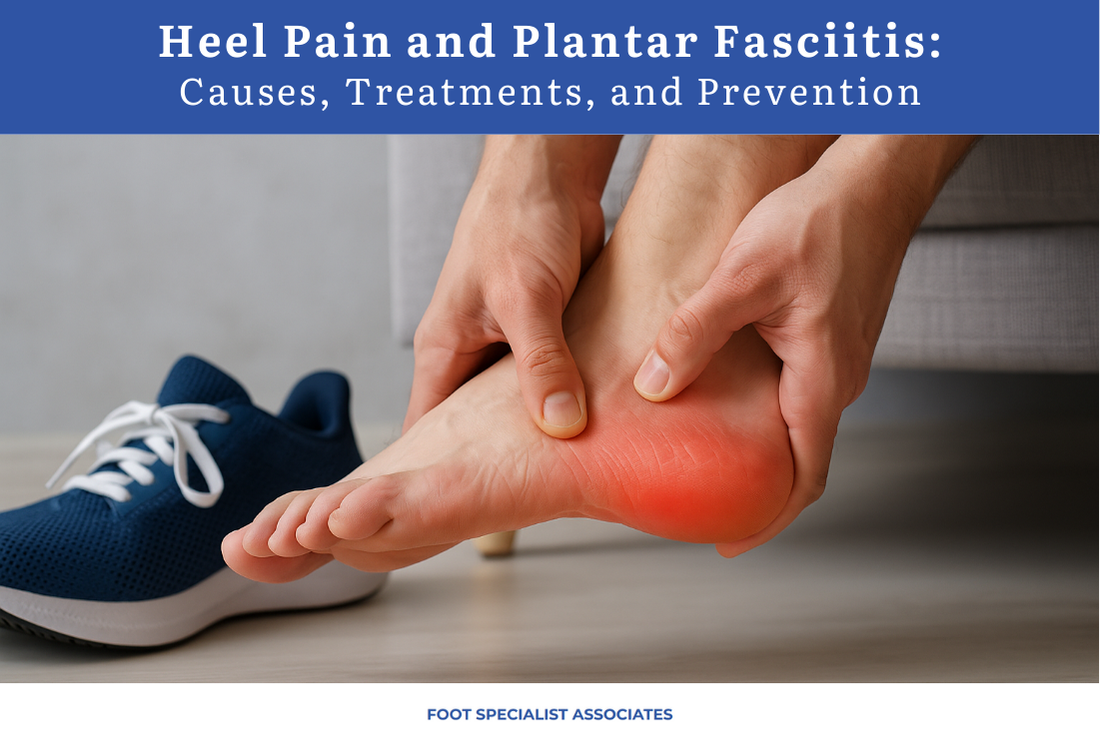 Heel pain is one of the most common foot complaints, and for many people, it’s often caused by plantar fasciitis—a condition that can affect daily activities, mobility, and quality of life. At Foot Specialist Associates in Denver, CO, we specialize in diagnosing and treating heel pain with personalized, effective solutions to help you get back on your feet comfortably.
Heel pain is one of the most common foot complaints, and for many people, it’s often caused by plantar fasciitis—a condition that can affect daily activities, mobility, and quality of life. At Foot Specialist Associates in Denver, CO, we specialize in diagnosing and treating heel pain with personalized, effective solutions to help you get back on your feet comfortably.
What Is Plantar Fasciitis?
Plantar fasciitis occurs when the plantar fascia—a thick band of tissue that runs along the bottom of your foot—becomes inflamed. This tissue connects your heel bone to your toes and helps support the arch of your foot. Repetitive strain or tension can lead to tiny tears, causing irritation, inflammation, and pain.
Common Causes of Heel Pain and Plantar Fasciitis
While plantar fasciitis can develop in anyone, certain risk factors increase your chances of experiencing it:
- Overuse or high-impact activities (running, jumping, prolonged standing)
- Flat feet or high arches
- Improper footwear without adequate arch support
- Excess body weight that increases pressure on the feet
- Tight calf muscles or Achilles tendon
- Occupational strain from jobs that require long hours on hard surfaces
Signs and Symptoms
Plantar fasciitis often presents with:
- Sharp heel pain with the first steps in the morning or after rest
- Pain after long periods of standing
- Discomfort that worsens after exercise
- Tenderness along the arch or heel pad
Diagnosis at Foot Specialist Associates
Our specialists will perform a thorough physical exam, review your medical history, and may use diagnostic imaging (such as X-rays or ultrasound) to rule out other causes of heel pain, like fractures, heel spurs, or nerve issues.
Treatment Options
Treatment for plantar fasciitis focuses on reducing inflammation, improving foot mechanics, and preventing recurrence. Our approach may include:
- Custom orthotics for proper arch support
- Stretching and strengthening exercises
- Anti-inflammatory medications
- Night splints to keep the plantar fascia gently stretched
- Shockwave therapy or laser therapy for persistent cases
- Corticosteroid injections or other injection therapies (when necessary)
- Lifestyle modifications like weight management and footwear changes
- Surgical intervention when conservative care fails
Prevention Tips
To help prevent plantar fasciitis or avoid recurrence:
- Wear supportive shoes with cushioning and arch support
- Stretch your calves and feet regularly
- Replace worn-out athletic shoes
- Avoid walking barefoot on hard surfaces for long periods
- Maintain a healthy weight to reduce foot stress
- Ice and take anti-inflammatories when needed
Q&A: Heel Pain and Plantar Fasciitis
Q: How long does it take to recover from plantar fasciitis?
A: Most patients see improvement within a few weeks to months with proper treatment. Severe cases may take 6–12 months to fully resolve.
Q: Can plantar fasciitis go away on its own?
A: Sometimes mild cases improve with rest and home care, but without addressing the underlying cause, symptoms may return.
Q: Are heel spurs the same as plantar fasciitis?
A: No. Heel spurs are bony growths on the heel bone. They can occur with plantar fasciitis but are not the root cause of the pain.
Q: Do I need surgery for plantar fasciitis?
A: Surgery is rare and only considered when all conservative treatments fail after several months.
Q: Can stretching really help?
A: Yes. Stretching the plantar fascia and calf muscles helps reduce tension and promotes healing.
Contact Foot Specialist Associates
If heel pain is affecting your daily life, don’t wait—early treatment can make all the difference.
Foot Specialist Associates
📍 950 E. Harvard Avenue, Suite 300, Denver, CO 80210
📞 Phone: (303) 722-6864
Make An Appointment – CLICK HERE
We’re here to help you take the first step toward pain-free living.